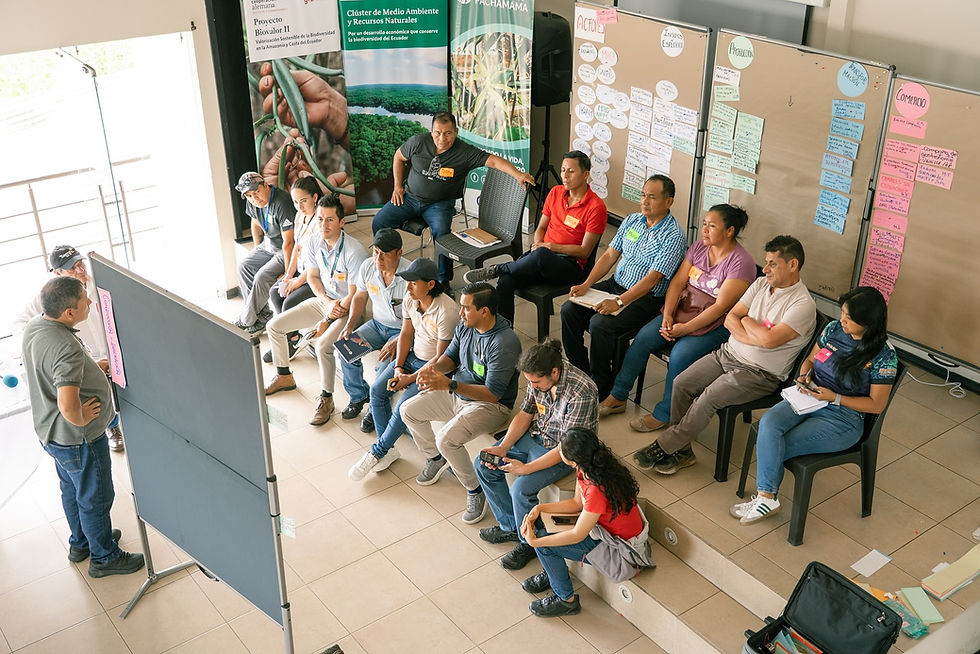Agriculture in Action: SAN Members Driving Change (August 9–15, 2025)
- Communications

- Aug 18, 2025
- 4 min read
At the Sustainable Agriculture Network (SAN), every week brings inspiring updates from our members working on the frontlines of sustainability. From strengthening youth leadership to advancing agroecological practices, restoring ecosystems, and championing indigenous rights, our members continue to demonstrate that change is not just possible—it’s already underway. Here’s a look at what happened last week across SAN’s global community.
🌱 Sustainable Agriculture & Agroecology
Agroecology was at the center of many members’ efforts this week. CORAF officially launched the RMRN Radius agroecology project in Burkina Faso, a four-year initiative designed to transform food systems across West and Central Africa. This program will empower producers to adopt innovative, sustainable practices adapted to local realities, in partnership with Cheikh Anta Diop University of Dakar.

In Uganda, PELUM hosted its second Indigenous Food and Seed Fair in Amolatar, celebrating the richness of traditional crops and healthy diets. The network also convened more than fifty young leaders through the YALTA Initiative for an agroecology mentorship program, equipping them with the entrepreneurial skills to turn sustainable farming into viable businesses. Meanwhile in Peru, RAAA promoted low-cost, pesticide-free weed control methods for fruit trees and emphasized the recognition of ancestral practices that safeguard agrobiodiversity, reminding us that ancient wisdom is vital for future resilience.

👩🏽🌾 Youth in Agriculture
International Youth Day (August 12) provided the perfect moment for members to spotlight the role of young changemakers in shaping the future of food. In Pakistan, CABI’s summer internship brought together thirty young scientists who gained hands-on experience in pest management, biocontrol, and food safety, strengthening national capacity for sustainable farming.
PELUM Uganda also celebrated youth innovation, highlighting their role in building greener food systems from farm to fork. At the same time, Rural Aid Pakistan engaged rural and marginalized youth through leadership programs that encourage action on the Sustainable Development Goals, demonstrating that young people are not just the leaders of tomorrow—they are the drivers of change today.

🌍 Climate & Ecosystem Restoration
Members also shone a spotlight on restoring balance between people and nature. Fundación Global Nature highlighted the arrival of the Nature Restoration Act, a landmark policy requiring that at least 30% of degraded ecosystems be restored by 2030. This ambitious goal covers wetlands, soils, rivers, farmland, and even urban areas, signaling a clear legal obligation for governments and communities alike.
Cotton Connect called attention to the silent crisis of groundwater loss, linking the problem to climate change and unsustainable water management practices that threaten farming livelihoods, while in Colombia, Fundación Natura shared the story of cocoa-growing families in Santander who are now collecting and analyzing meteorological data to make better decisions on their farms. By anticipating disease risks and preparing for climate variability, these families are building resilience at the farm level and beyond.
🌾 Sustainable Value Chains & Markets
In Indonesia, Preferred by Nature gathered more than 250 farmers, millers, policymakers, researchers, and private sector partners at the Forum on Indonesia Sustainable Rice (FISR) 2025. Together, they explored practical solutions to building climate-resilient rice systems, showcasing farmer-led innovation and cross-sector collaboration. The organization also announced its upcoming presence at Climate Week NYC this September, where it will contribute to global conversations on forest protection, supply chain accountability, and nature-based solutions. These efforts reinforce the critical importance of connecting local innovation to global market and policy dialogues.

🌳 Indigenous Peoples & Community Rights
The week also marked the International Day of the World’s Indigenous Peoples, providing a moment to celebrate the contributions of indigenous communities to sustainable agriculture. Wild Asia highlighted the story of Mah Meri oil palm farmer Reta Lajah, featured in CNN Business for her role in promoting sustainable palm oil production in Malaysia. Her story reflects the broader importance of recognizing indigenous knowledge and leadership as essential components of truly sustainable food systems.
🏆 Recognition & Innovation
Innovation was also celebrated this week, as CABI’s BioProtection Portal received Gold at the 2025 Stevie® Awards for Sustainability Initiative of the Year in Europe. This recognition underscores the impact of accessible, science-based tools that help farmers transition away from chemical inputs toward more sustainable pest management practices.
From innovative agroecological practices to empowering youth, advancing ecosystem restoration, and honoring indigenous leadership, SAN members are creating ripple effects of positive change across the globe. Their collective efforts remind us that transforming agriculture is both urgent and possible when we work together.
Stay tuned to SAN for more weekly updates on how our members are driving this transformation forward. And don’t forget to engage with us—share these stories, support member initiatives, and join us in building a more sustainable, equitable, and resilient food system for all.




Comments